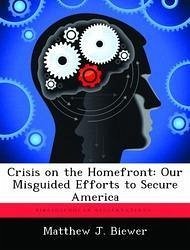The purpose of this paper is to examine the reasons behind the lack of progress in securing our homeland. The paper begins by summarizing government reports on the poor state of Homeland Security; establishing the fact, that the government made only incremental progress over the past six years. The Culture, Institutions and Interests model aggregates the driving factors behind this paralysis into its three elements. This paper identifies our respect for civil liberties and the relative newness of terrorist attacks in the homeland as the primary cultural drivers of our paralysis. Regarding institutions, fierce infighting and competition impedes cooperation between the Department of Defense, the national intelligence agencies, the Federal Bureau of Investigation, Department of Homeland Security and local law enforcement agencies. Moreover, the lack of government standards has marginalized the contribution of the private sector. Finally, domestic (Congress, government institutions, the media) and international actors (Pakistan, Saudi Arabia) have primary interests that diverge from the US national interest of improving Homeland Security. These factors enable only incremental improvements to Homeland Security and preclude revolutionary advances. They are inherent to our system of government and are unlikely to change. Therefore, our ability to defend against terrorist attacks with domestic defenses is limited, requiring a shift in our National Security Strategy towards mitigating the catalysts behind the creation of Islamists vice primarily seeking to deter and kill them.
Hinweis: Dieser Artikel kann nur an eine deutsche Lieferadresse ausgeliefert werden.
Hinweis: Dieser Artikel kann nur an eine deutsche Lieferadresse ausgeliefert werden.








